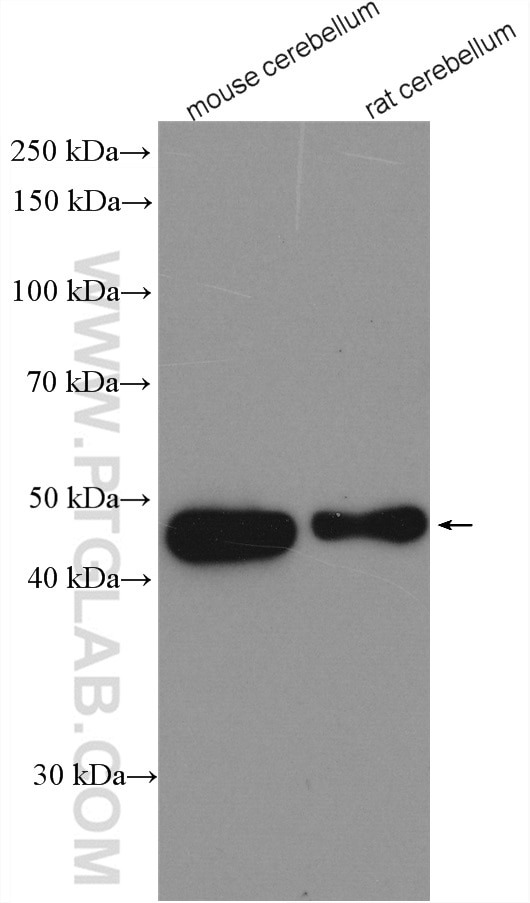PAX2 Polyklonaler Antikörper
PAX2 Polyklonal Antikörper für WB,ELISA
Wirt / Isotyp
Kaninchen / IgG
Getestete Reaktivität
human, Maus, Ratte
Anwendung
WB, IHC, FC, ELISA
Konjugation
Unkonjugiert
Kat-Nr. : 29307-1-AP
Synonyme
Galerie der Validierungsdaten
Geprüfte Anwendungen
| Erfolgreiche Detektion in WB | Maus-Cerebellum-Gewebe, Ratten-Cerebellum-Gewebe |
Empfohlene Verdünnung
| Anwendung | Verdünnung |
|---|---|
| Western Blot (WB) | WB : 1:500-1:2000 |
| It is recommended that this reagent should be titrated in each testing system to obtain optimal results. | |
| Sample-dependent, check data in validation data gallery | |
Veröffentlichte Anwendungen
| IHC | See 1 publications below |
| FC | See 1 publications below |
Produktinformation
29307-1-AP bindet in WB, IHC, FC, ELISA PAX2 und zeigt Reaktivität mit human, Maus, Ratten
| Getestete Reaktivität | human, Maus, Ratte |
| In Publikationen genannte Reaktivität | human |
| Wirt / Isotyp | Kaninchen / IgG |
| Klonalität | Polyklonal |
| Typ | Antikörper |
| Immunogen | PAX2 fusion protein Ag30717 |
| Vollständiger Name | paired box 2 |
| Berechnetes Molekulargewicht | 431 aa, 46 kDa |
| Beobachtetes Molekulargewicht | 45 kDa |
| GenBank-Zugangsnummer | BC148710 |
| Gene symbol | PAX2 |
| Gene ID (NCBI) | 5076 |
| Konjugation | Unkonjugiert |
| Form | Liquid |
| Reinigungsmethode | Antigen-Affinitätsreinigung |
| Lagerungspuffer | PBS mit 0.02% Natriumazid und 50% Glycerin pH 7.3. |
| Lagerungsbedingungen | Bei -20℃ lagern. Aliquotieren ist bei -20oC Lagerung nicht notwendig. 20ul Größen enthalten 0,1% BSA. |
Hintergrundinformationen
PAX2 is a transcription factor, primarily expressed during embryonic development. It has a critical role in the development of the urogenital tract, the eyes, and the CNS. It plays a key role during renal development and to act as an oncogene favoring renal tumor growth. PAX2 was suggested as a sensitive and highly specific marker for renal cell carcinoma (RCC).
Protokolle
| Produktspezifische Protokolle | |
|---|---|
| WB protocol for PAX2 antibody 29307-1-AP | Protokoll herunterladen |
| Standard-Protokolle | |
|---|---|
| Klicken Sie hier, um unsere Standardprotokolle anzuzeigen |
Publikationen
| Species | Application | Title |
|---|---|---|
Sci Bull (Beijing) Reprogramming of Ovarian Granulosa Cells by YAP1 Leads to Development of High-Grade Cancer with Mesenchymal Lineage and Serous Features. | ||
Cells Human iPSC-Derived Renal Cells Change Their Immunogenic Properties during Maturation: Implications for Regenerative Therapies. |


